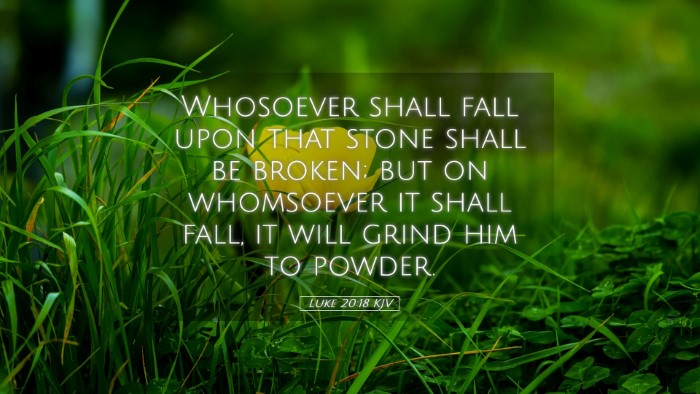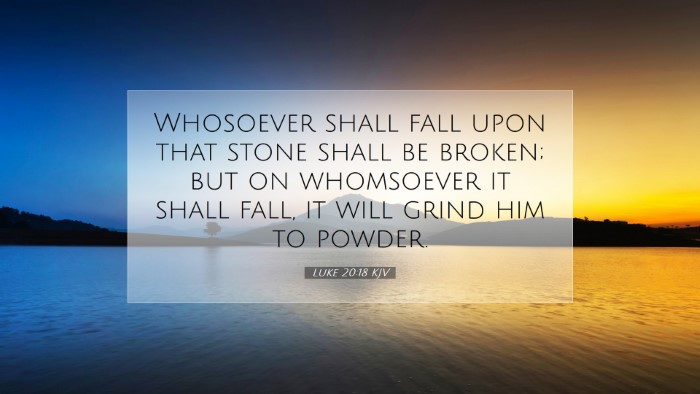Commentary on Luke 20:18
Verse: “Whosoever shall fall upon that stone shall be broken; but on whomsoever it shall fall, it will grind him to powder.” (Luke 20:18)
Introduction
The verse from Luke 20:18 is a profound statement made by Jesus during His parable of the wicked husbandmen. This text illustrates the dual nature of Christ as both a stone of grace and a stone of judgment. In understanding its implications, we draw insight from various public domain commentaries to glean deeper theological meanings and applications for believers.
Contextual Analysis
This verse appears in the context of Jesus’ teachings in the temple, where He confronts the religious leaders who challenge His authority. He employs parables to reveal their rejection of God's messengers and, ultimately, His Son. The stone metaphor signifies the foundation of the church and highlights the consequences of rejecting Christ.
Matthew Henry's Commentary
Matthew Henry emphasizes the importance of the stone imagery, noting that it represents Christ Himself. He writes that "whosoever shall fall upon that stone shall be broken," reflecting the idea that those who humble themselves before Christ and acknowledge their sins will experience contrition and ultimately salvation. However, Henry points out the severity of the latter part of the verse, where he explains that those who persistently reject Him will face dire consequences: the stone will fall upon them, resulting in destruction.
Albert Barnes' Synopsis
According to Albert Barnes, the stone symbolizes the kingdom of God and the judgment that comes upon those who oppose it. He interprets the phrase “shall be broken” as indicating that an admission of guilt leads to a path of redemption, while those who deny their need for repentance will find themselves crushed under the weight of their sins and ultimate judgment. Barnes reflects on the idea that Christ, as the cornerstone, is essential for the believer’s faith yet can also serve as a stumbling block for unbelievers.
Adam Clarke's Interpretation
Adam Clarke offers a rich perspective on the phrase "whosoever shall fall upon that stone." He suggests that this falling can be seen as an act of faith that leads to transformation. Clarke notes that this brokenness is a process through which God reshapes the believer’s life. In contrast, the latter part of the verse signifies swift judgment for those who reject the Gospel, emphasizing the serious implications of one's response to Christ.
Interpretative Themes
- The Duality of Christ: Jesus is both a savior and a judge. The passage underscores the necessity of recognizing Him in both roles.
- Brokenship vs. Judgment: The text presents a stark contrast between the humility that leads to healing and the obstinacy that leads to destruction.
- Faith and Repentance: The rightful reaction towards Christ should involve falling upon the stone in repentance, leading to a restoration of relationship with God.
Theological Implications
The theological implications of this verse are significant for preaching and teaching contexts. It serves as a reminder of the necessity for personal reflection and repentance in the life of every believer. The imagery of the stone resonates with the prophetic traditions of the Old Testament, where God is depicted as a rock and refuge. The reference to falling upon the stone invites believers to submit to Christ's authority, allowing Him to break their pride and reshape their hearts.
Practical Applications
- Encouragement for the Downtrodden: Those feeling crushed by life's burdens can find solace in falling upon Christ for healing.
- Warning to the Unrepentant: It serves as a significant admonition for those who resist the call to faith, emphasizing the importance of making a choice about Christ.
- Call for Humility: Leaders and followers alike are reminded of their reliance on Christ as the cornerstone of their faith.
Conclusion
Luke 20:18 encapsulates the essence of Christ’s mission: to break the hearts of sinners through grace while simultaneously warning of the inevitable judgment awaiting those who reject His name. As pastors, students, theologians, and Bible scholars engage with this verse, it is imperative to communicate its duality, urging a response that acknowledges both the grace and the justice of God as revealed in Jesus Christ. The stone signifies both a refuge for the weary and a warning for the arrogant, contributing to the rich tapestry of the Gospel.


